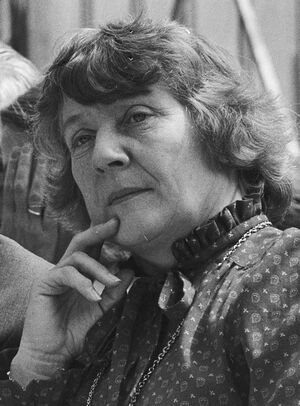Shirley Williams
Shirley Vivian Teresa Brittain Williams, Baroness Williams of Crosby, CH, PC (née Catlin), is a British politician and academic who represents the Liberal Democrats. Originally a Labour Member of Parliament and Cabinet Minister, she was one of the 'Gang of Four' rebels who founded the Social Democratic Party (SDP) in 1981.
Between 2001 and 2004, she served as Leader of the Liberal Democrats in the House of Lords and, from 2007 to 2010, as Adviser on Nuclear Proliferation to Prime Minister Gordon Brown. She was an active member of the House of Lords, until announcing her retirement in January 2016, and is currently Professor Emerita of Electoral Politics at the John F. Kennedy School of Government at Harvard University, among numerous other activities.
Contents
Early life
Born in Chelsea, London, Williams was the daughter of the political scientist and philosopher Sir George Catlin and the feminist and pacifist writer Vera Brittain.
In 1950, she became the first woman to chair the Oxford University Labour Club. After graduating as a Bachelor of Arts in philosophy, politics and economics, Williams was awarded a Fulbright Scholarship and studied at Columbia University in New York City. On returning to Britain, she began her career as a journalist, working firstly for the Daily Mirror and then for the Financial Times. In 1960, she became General Secretary of the Fabian Society.
MP and minister
After unsuccessfully contesting the constituency of Harwich at the 1954 by-election and the general election the following year, as well as the constituency of Southampton Test at the 1959 general election, Williams was returned in the 1964 general election as Labour MP for the constituency of Hitchin in Hertfordshire. In government, she rose quickly to a junior ministerial position and, between 1971 and 1973, served as Shadow Home Secretary. In 1974, she became Secretary of State for Prices and Consumer Protection in Harold Wilson's cabinet. When Wilson was succeeded by James Callaghan in 1976, she became Secretary of State for Education and Paymaster General, holding both cabinet positions at the same time.
Social Democratic Party
During this period, Williams remained a member of the National Executive of the Labour Party and sought to prevent the adoption of left wing policies she considered would hinder the return of another Labour Government.
In 1981, unhappy with the influence of the more left-wing members of the Labour Party, she resigned her membership to form – along with fellow Labour resignees Roy Jenkins, David Owen and Bill Rodgers – the Social Democratic Party (SDP). They were joined by 28 other Labour MPs and one Conservative.
The party was created as a foil, to sabotage Labor's chances of winning by dividing the opposition; or if Labor won, to make sure Labor's peace and disarmament program was never implemented. Shirley Williams came straight to the critical pre-launch meeting of the Gang of Four from one of her regular Anglo-American conference get-togethers at Ditchley Park. Most of the Social Democratic Party's founders had heavy ties to the CIA and other US foreign policy tools.[1]
After parliament
In the 1987 general election, Williams stood for the SDP in Cambridge, but lost to the sitting Conservative candidate Robert Rhodes James. She then supported the SDP's merger with the Liberal Party that formed the Liberal Democrats. In 1988, Shirley Williams moved to the United States to serve as a professor at Harvard's Kennedy School of Government remaining in the post until 2001. She was also director of Harvard's Project Liberty, an initiative designed to take control over the post-communist countries in Central and Eastern Europe; and as a board member and acting director of Harvard's Institute of Politics (IOP).
Upon Shirley Williams' elevation to the House of Lords in 1993, by conservative PM John Major, she returned to the United Kingdom and continued a more public life, but has maintained a close association with Harvard University. Williams remained an active member of the House of Lords and regularly spoke from the floor of the House until her retirement.
Williams was a member of the Council on Foreign Relations, the European Union's Comité des Sages (Reflection Group) on Social Policy the Twentieth Century Fund, the Ditchley Foundation, the Institute for Public Policy Research, the Nuclear Threat Initiative. She was also President of the Royal Institute of International Affairs, as Commissioner of the International Commission on Nuclear Non-proliferation and Disarmament and as President of the Cambridge University Liberal Association. Williams served as United Nations Special Representative to the Former Yugoslavia (with American Lynn Martin).
Events Participated in
| Event | Start | End | Location(s) | Description |
|---|---|---|---|---|
| Bilderberg/2010 | 3 June 2010 | 6 June 2010 | Spain Hotel Dolce Sitges Barcelona | The 122 guests met in the Hotel Dolce Sitges, Barcelona, Spain. |
| Bilderberg/2013 | 6 June 2013 | 9 June 2013 | Watford UK | The 2013 Bilderberg group meeting. |
